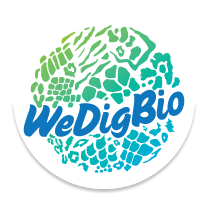2017 Event List
Monday, October 23, 2017 - 14:00 to 15:30
This is an introductory WeDigBio Digitization Blitz event for EcoTarium staff.
Sunday, October 22, 2017 - 12:00 to 15:00
Join us in transcribing fossils from the polar collection.
Sunday, October 22, 2017 - 09:00 to 13:00
The Natural History and Collections Club at Oregon State University is hosting an onsite event at OSU Corvallis campus
Friday, October 20, 2017 - 18:00 to 21:00
Create digital data about plant specimens collected in Florida over the past 200 years for the benefit of science, society, and our flora
Friday, October 20, 2017 - 09:00 to 17:00
This effort will help make collection data for our specimens available to everyone online!
Friday, October 20, 2017 - 08:30 to Saturday, October 21, 2017 - 12:30
You’re invited to join a worldwide effort (WeDigBio) to digitize the planet’s many biological collections
Friday, October 20, 2017 - 08:00 to 15:30
As part of the Arkansas Science Festival at Arkansas State University, the ACBC will be hosting a WeDigBio transcription event
Thursday, October 19, 2017 - 18:00 to 21:00
Create digital data about plant specimens collected in Florida over the past 200 years for the benefit of science, society, and our flora
Thursday, October 19, 2017 - 13:00 to 16:00
Join us for a citizen science transcription blitz!
Thursday, October 19, 2017 - 10:00 to Sunday, October 22, 2017 - 02:00
Join us in transcribing scientific label data from our collections and from field notes books using online and computer tools.
Thursday, October 19, 2017 - 08:00 to Sunday, October 22, 2017 - 22:30
From the 19th to the 22nd of October, the Natural History Museum in London is taking part in WeDigBio 2017






